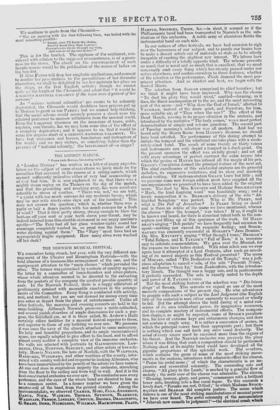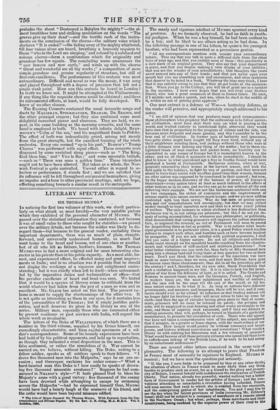THE NORWICH MUSICAL FESTIVAL.
WE remember being struck, last year, with the very different ma- nagement of the Chester and Birmingham Festivals—with the total absence of a business-like arrangement of the one, and the omnipresent attention to the "main chance" which pervaded the other. The former was patronized by a coterie of country squires ; the latter by a committee of brass-founders and silver-platers, whose whole -attention seemed to be directed to the extracting from the pockets of the company the greatest possible quantity of cash. In the Norwich Festival, there is a happy admixture of gentlemanly conduct with mercantile exactness in the arrange- ments of the Committee. Every thing is conducted with activity, zeal, and method; but you are not dunned for money every time you enter or depart from the place of entertainment. Unlike all other festivals, the morning and evening concerts are held in the same building. Although Norwich possesses a noble cathedral, and several parish churches of ample dimensions for such a pur- pose, the Guildhall (or, as it is there called, St. Andrew's Hall) certainly offers facilities for a musical festival superior to these, and superior to those of any building we ever saw. We presume it was once the nave of the church attached to some monastery. Its lofty and beautiful proportions, and its ample unencumbered space, are equally adapted to give effect to the band, and to afford almost every auditor a complete view of the immense orchestra. Its walls are adorned with portraits by GAINSBOROUGH, LAW- RENCE, OPIE, HOPPNER, BEECHEY, and other artists of less cele- brity. Here is NELSON, the hero of Norfolk, with the WALPOLES, BARBORDS, WINDHAMS, and other worthies of the county, inter- mixed with sundry well-fed and respectable-looking Aldermen, who have been immortalized by the pencils of the artists we have named. At one end rises in stupendous majesty the orchestra, stretching from the floor to the ceiling and from wall to wall. And it is the best-constructed orchestra we ever saw. The conductor sees every performer, and the eyes of the whole band are directed to him as to a common centre. In a former number we have given the muster-roll of the hand, from the printed circular. Among the instrumentalists, we observed CRAMER, MORI, ELLA, ANDERSON, DANCE, NicK, WATKINS, THOMAS, SEYMOUR, BLAGROTE, WAGSTAFF, PENSON, LINDLEY, CROUCH, BROOKS, BRAGONETTI, es SMART, BOND, NICHOLSON, WILLMAN, MACINTOSH, 111,62T1 'HARPER, SMITHIES, CHIPP, &c.—in short, it seemed as if the Phi/harmonic band had been transported to Norwich as the sub- stratum of this orchestra A noble army of choristers flanks the instrumental band on each side.
In our notices of other festivals, we have had occasion to sigh over the barrenness of our subject, and to puzzle our brains how to make a decent article out of materials so stale as to be utterly incapable of exciting the slightest new interest. We labour here under a difficulty of a totally opposite kind. The scheme presents so much that is novel and so much that is excellent, that we must necessarily omit every thing which has already passed under our notice elsewhere, and confine ourselves to those features, whether of the selection or the performance, 41liel1 demand the most pro- minent attention. And as chiefest and best, we begin with the Sacred Music.
The selection from Samson comprized its chief beauties ; but we think it might have been improved. Why was the chorus " To dust his glory they would tread," omitted—forming, as it does, the finest accompaniment to the air, and the most interesting part of the scene —and " Why does the God of Israel," allotted to VAUGHAN, instead of the more quiet, and therefore, for him, more suitable air, of "Thus when the sun ?" The effect of the Dead March, corning in its proper situation in the oratorio, and introduced by the recitative " The body comes," was a most perfect demonstration of simple and solemn grandeur. The second part of Tuesday morning's selection was all modern. And had we heard only the Storm Scene from HAYDN'S Seasons, we should have been satisfied. No performance of this daring attempt to imitate the tempest and the whirlwind can take place with a mode- rately-sized band. The crash of some twenty or thirty voices and instruments can only depict a tempest in a duck-pond. On the present occasion the effect was awfully grand ; and set off , with every advantage of perfect contrast the calm repose into which the genius of HAYDN has infused all the magic of his pen. GRAUN'S Crucifixion formed the principal feature of the next act.
The chief excellencies of this celebrated oratorio are its graceful melodies, its expressive recitatives, and its clear and masterly choral writing. Of instrumentation GRAUN knew but little ; and we presume some new foreign edition must have supplied all the accompaniments we perceived to have been added to the original score. The duet by Airs. KNYVETT and Madame STommausEri "Hark, the kind forgiving word" was beautifully sung ; and a lovely composition it is. BRAHAM'S ..delivery of the solo " Af- frighted Seraphim" was perfect. Who is Mr. PERRY, and what is The Fall of Jerusalem ? IS PERRY living or dead? and is there an oratio of the name we have mentioned, whence the chorus "Blow the trumpet," was taken ? If so, it ought to be known and heard, for there is abundant talent both in the con- ception and filling up of this specimen of the work. Of MALI- BRAN'S singing "Deh parlate" we have frequently had occasion to speak—nothing can exceed its exquisite feeling; and STOCK- HAUSEN was eminently successful in MOZART'S "Jests Domine." On Mrs. KNYVETT'S singing "What though I trace," BRAHMA'S "Total Eclipse, and E. TAYLOR'S "Fall of Zion," it is unneces- sary to reiterate commendation. We pass over the Messiah, for the reasons we have before stated. With what relish can we ever twain hear it attempted at a Lent Oratorio, after such an unveil- ing of its sacred majesty as this Festival presented? The scena of MOZART, called "The Dedication of the Temple," was a judi- cious adaptation to sacred words, of the solo "Possenti Nun," and the chorus "Grail Isi," from Zauberflotte, with the introduc- tory March. The thought was a happy one, and in performance it perfectly succeeded. The solo is exactly suited to the depth and power of E. TAYLOR'S voice. But the most striking feature of the selection was "Die letzen dinge" of SPOHR. This oratorio we regard as one of the most masterly compositions of the present day. He who adventures to grapple with such a subject as the Last Judgment (the English title of the oratorio) is sure either eminently to succeed or wholly to fail. But the attempt shows the bold daring of a mind con7 scions of its own intellectual power, its imaginative resources, and its complete mastery of instrumental effects. The composi- tion displays, as might be expected, some of SPOHR'S peculiari- ties, his love of extreme keys and enharmonic changes, and does not contain a single song. It is rather a succession of scenes, in which the principal voices bear their appropriate part; but there is nothing which can call forth any mere vocal dexterity. The mind of every singer must be exercised more than the organs of his throat. And the Norwich orchestra was precisely the place where it was fitting that such a composition should be performed. Nothing short of its mighty band could have developed all the gigantic proportions of this splendid work. The overture, which contains the germ of some of the most striking move- ments in the oratorio, introduces with admirable effect. the chorus, "Praise his awful name ;" of which the characteristic is an im- pressive and reverential solemnity. The succeeding solo and chorus, "All glory to the Lamb," is marked by a graceful flow of melody ; the sotto voce of the chorus was admirable. The chorus, " Blessing, honour, glory, and power," commences with. a brilliant tenor solo, breaking into a fine vocal fugue. To this succeeds a lovely duet, "Forsake me not, 0 God ;" to which Madame STOCK... nAusEN and BRAHAH did complete justice. The scene which follows is, one Of the most striking manifestations of musical power we have ever heard. The awful solemnity of the annunciation "Jehovah now cometh to judgment r'—the electrical crash which preludes the shout "Destroyed is Babylon the mighty !"—the al- most breathless tone and striking modulation on the words "The graves give up their dead"—and the terrific rush of the instru- ments on the conclusion of the chorus—the solitary voice which declares "It is ended !"—the fading away of the mighty whirlwind, till four voices alone are heard, breathing a heavenly requiem to those "who in the Lord are sleeping," and echoed by a subdued and solemn chorus—form a combination which for originality and grandeur has few equals. The concluding scene announces the "new heaven and new earth," and winds up with the chorus "Great and wonderful are all thy works ;" a composition of more simple grandeur and greater regularity of structure, but still of first-rate excellence. The performance of this oratorio was most extraordinary. Difficult and, novel as Was the music, it was sung and played throughout with a degree of precision that left not a single weak point. How can this oratorio be heard in London'? In truth we know not. It might be attempted at the Philharmonic, if any thing like the requisite chorus could be obtained ; and there its instrumental effects, at least, would be fully developed. We know of no other chance.
The Evening Concerts contained the usual favourite songs and duets by MALIBRAN, STOCKHAUSEN, BRAHAM, DE BEGNIS, and the other principal singers ; but they also contained some most delightful concerted pieces and-choruses. They are held, we re- peat, in the same building as the morning concerts, and the same band is employed in both. We heard with infinite delight, BEET- HOVEN'S "Calm of the sea," and his magnificent finale to Fidelio. The effect of both was indescribably grand, arising not merely from the great strength, but the excellent training of the whole orchestra. Every one seemed "up in his part." BISHOP'S" Tramp Chorus" was performed with equal effect. These concerts were disgraced by some wretched slang pieces—such as "The Kim", God bless him," and" Vive le Roi ;" and some miserable ballad's, —such as" There was once a golden time." These blemishes ought not to have been allowed. But taken as a whole, the Nor- wich Festival is quite unrivalled. Viewed either in regard to se- lection or performance, it stands first.; and we are satisfied that its influence will be felt throughout our musical hemisphere, giving an impulse and atone to other provincial meetings, and, we hope, effectmg something towards a similar result in the metropolis.



























 Previous page
Previous page